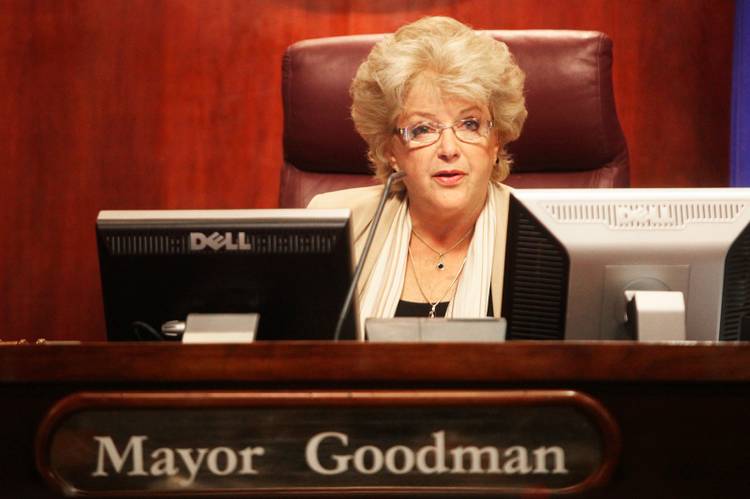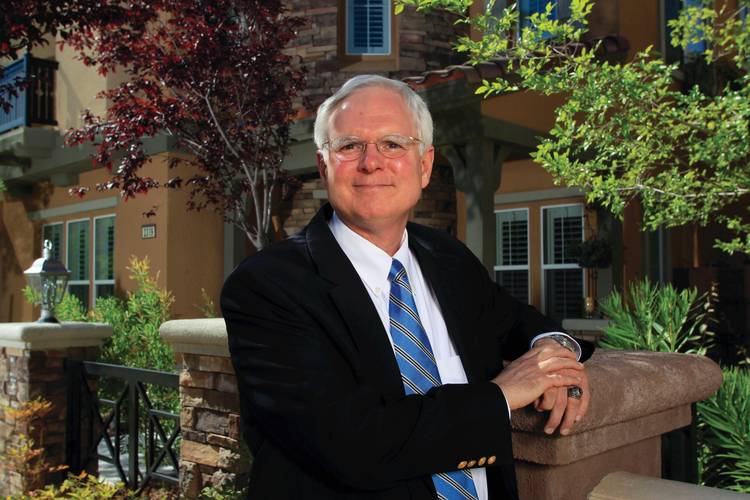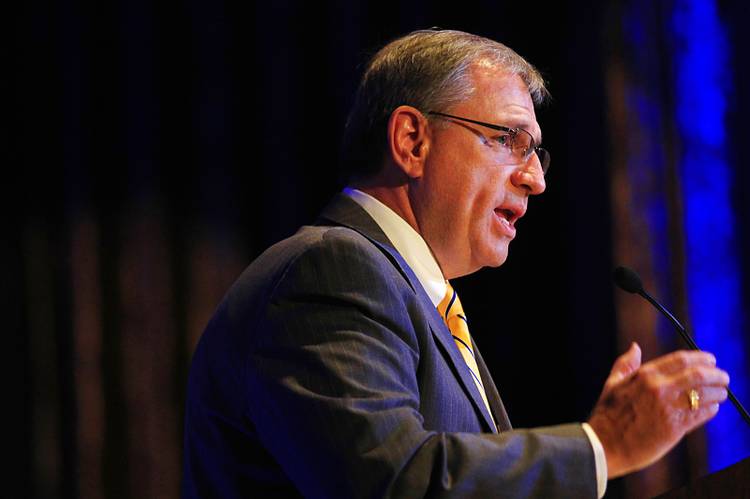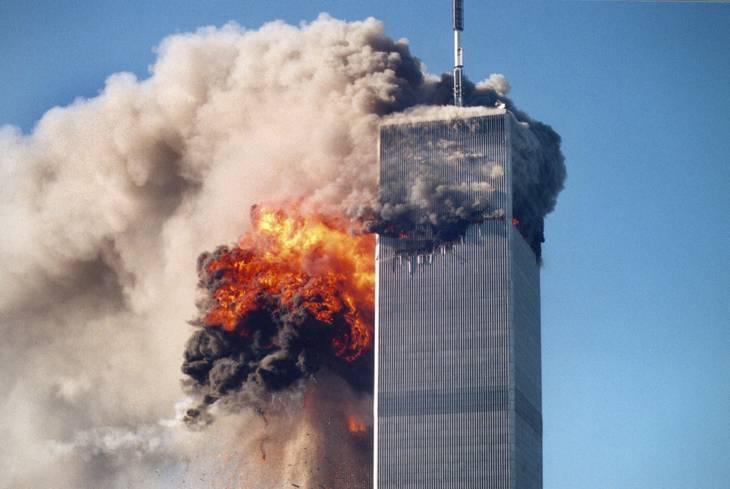VEGAS INC coverage of the 9/11 anniversary
As a longtime New Yorker and eyewitness to the horrific events of September 11, I knew I wanted to devote a special issue of VEGAS INC to the tenth anniversary of that fateful, terrible day in American history. The idea was simple: Ask prominent Las Vegas business leaders two direct questions: 1) Where were you when it happened? 2) How has our city been affected, if at all?
I was fascinated by the notion of a city so fully reliant on happy tourists coming to gamble with their discretionary income suddenly thrust into the harsh reality that no one’s coming — at least not by airplane, for a while. Did Las Vegas’ business elite fully see the events that unfolded in Manhattan as relevant, important and connected to Las Vegas, or not? Was the ensuing fear palpable, or was the only fear Las Vegans had that of lost revenue? Did September 11, 2001, matter to the Strip like it mattered to Wall Street?
With quiet skies and empty hotel rooms, the immediate aftermath of the terrorist attacks in New York City and Washington, D.C., on Las Vegas was nothing short of fascinating. Don’t take my word for it. Take a gander for yourself.
— Richard Pérez-Feria, editor in chief
-
Gary Loveman
CEO, Caesars Entertainment
Where were you?
I was in San Francisco at the Bank of America Investor Conference, along with 200 other CEOs and CFOs. I was in the gym when the first plane hit and in a ballroom with lots of other attendees when the rest of the tragedy played out. Of course, I checked on our businesses and began to work with operators to consider what to do logistically about the fact that guests could not get home and our arrivals could not travel into our properties. Personally, like everyone else, I was stunned and fearful of what this would mean to our safety and way of life in a future when we would be concerned with subsequent attacks within the US and especially in prominent places such as Vegas. Further, several people from my town in the Boston area died in the planes that left from Boston, including the father of a child in my kids’ school. I had flown from Boston to San Francisco on the same airline and a similar flight (two hours later) from one of the ones that was taken by the terrorists. I was unable to leave San Francisco by plane for five days and spent lots of time reassuring family and friends, as we all did.
-

Carolyn Goodman
Mayor, Las Vegas
Where were you?
I was getting ready for work and had the television news station on, with the sound down. I thought when the first plane hit the north tower that I had inadvertently turned on a movie channel.
How did it affect us?
Short term, Las Vegas suffered as people decided not to travel, but we were able to come back as we always do, and thankfully that downturn didn’t last long. One of the major long-term effects has been an increased vigilance by all our businesses. Security has always been important in Las Vegas, but now additional steps are taken to ensure the safety of residents and guests.
-

Paul Bell
President, Greater Las Vegas Association of Realtors
Where were you?
We were at home, and all of a sudden I saw the news flash on the Internet. We were shocked. I was concerned for some time that this might happen. We called our son in boarding school in Alexandria, VA, to make sure he was all right. He was two miles from the Pentagon. We couldn’t get through on the phone, but we got an e-mail that he was safe. He had heard the explosion.
How did it affect us?
Las Vegas was definitely impacted with major hotel room cancellations, but I think our economy rebounded quickly. Las Vegas is one of the safest cities in the country, and it created greater security awareness for all of us.
-
Steve Holloway
Executive Vice President, Associated General Contractors of Las Vegas
Where were you?
I was at work and was able to watch some of it on the Internet. It was a pretty lost day for me and the staff. That’s all we could talk about. I was alarmed and angry that terrorists could somehow pull that off on our soil.
How did it affect us?
There was an immediate dip in the economy and slowdown in construction jobs for a period of time there. I don’t think it had any continuing effect on our industry. We have bigger economic problems than that, but Homeland Security and wars contributed to our deficit and economic problems.
-
Steve Schorr
Vice President for public and government affairs, Cox Communications, Las Vegas
Where were you?
I was getting dressed for work when I heard the first reports on one of the morning TV shows. I stopped what I was doing and became glued to the TV. I remember saying over and over “I can’t believe this is happening in America.” As a former firefighter—and with a son who’s also a firefighter—I was touched by the displays of heroism, but also filled with pain watching so many lives being lost.
How did it affect us?
Like most cities in America, the Las Vegas community was affected. Local businesses and our primary industry suffered dramatically because of the crippling effect on international and domestic travel; likewise, this hurt us all. I was, however, proud to see the business community rebound, and I have hope the same will happen following today’s economic challenges.
-
Rossi Ralenkotter
President and CEO, Las Vegas Convention and Visitors Authority
Where were you?
The day of the tragic events coincided with an LVCVA board meeting, so I was at the office preparing for that meeting when the events unfolded. Like everyone, I was shocked and saddened by the tragedy.
How did it affect us?
The entire travel and tourism industry in the United States was affected by the events. Las Vegas felt the effects for several months. The LVCVA was at the forefront of helping the industry move forward. We conducted national research that indicated people wanted some reassurance they could resume their regular lives. We put together a campaign with the message that it was OK to travel and work toward recovery.
-
Maurice Gallagher
Chairman and CEO, Allegiant Air
Where were you?
I was here in Las Vegas. I have a distinct recollection of coming out of a 24-Hour Fitness at seven in the morning and looking up at a television monitor and doing a double-take. It was jaw-dropping. I didn’t know what it was at the time, but I knew it wasn’t going to be good for any of us.
How did it affect us?
There certainly was a short-term effect on Las Vegas. There was a very sharp cutback on jobs. I think 17,000 people were laid off. But in Las Vegas, we seemed to recover quicker than everybody else and we shook off those short-term issues. As a community, we were back pretty quickly. I think distance has its benefits. On the East Coast, there were all kinds of scares with unidentified packages. Everybody was nervous about this new enemy that had emerged. I think in a backhanded way, Las Vegas actually benefited in the long term because we were recognized as a safe place to go. For international travel, we were viewed as being a safer place. The episode definitely benefited Allegiant. Because demand was down so much, air travel became more reasonably priced. And that’s where things got better for us because we’re recognized for low fares. So there were short-term problems, but ultimately the airline industry got a shot in the arm when demand came back.
-
Kevin Kelley
Chief Operating Officer, Station Casinos
Where were you?
I was standing in my kitchen at home when my mother-in-law called to tell us to turn on the TV. The first airplane had flown into the tower and at the time the world thought it was just an incredible, unfortunate accident. After the second plane flew into the other WTC tower and the Pentagon was hit, it was an overwhelming feeling of disbelief and the tough realization that our country experienced a terrorist attack. We were all shocked, stunned and dismayed at the gravity of the event.
How did it affect us?
As the shock wore on that day at work, CEO Frank Fertitta immediately rallied the leadership team together to determine what we needed to do for our team members and thousands of our hotel guests as we had to react quickly to the travel implications of the halting of all air traffic. What was most important to Frank was to ensure that we preserve all our team members’ jobs. We were among the few fortunate companies in Las Vegas that were to keep every team member employed, and thankfully the Las Vegas locals market recovered quickly. We learned tremendous lessons that served as a great learning experiences for how we can come together during challenging times.
-
Myron Martin
CEO, Smith Center for the Performing Arts
Where were you?
I remember waking up early that day and turning on the TV in my kitchen just as the second plane was hitting the World Trade Center. I was shocked, saddened and outraged. I had moved to Las Vegas from New York City, and I couldn’t believe what I was seeing. That day I talked to Clint Holmes about doing something. The very next night, a group of entertainers, managers and producers met at Ruth’s Chris Steakhouse on West Flamingo to discuss creating a show in support of the victims. Wayne Newton, Bernie Yuman, Frank Lieberman, Bill Acosta, Franki Scinta, Lance Burton, Dave Kirvin, Bob Anderson, Joe Schenk (whose PRG company would play an important production role) Neil Miller, Clint and I were among the group who talked about giving to the September 11 fund by hosting a first-ever concert event featuring all the entertainers in Las Vegas. Neil and I started working (volunteering) the next day by looking for a venue and talking to performers. Wayne hosted a meeting at his house a week later and we agreed to hold the event at Mandalay Events Center (thanks to Glenn Medas) on November 11, which happened to be Veterans Day. By now, it appeared that the New York fund was going to be well subsidized, and we talked about supporting other needs. Wayne had been named chairman of the USO and someone said that we should give our concert proceeds to them in support of our troops—because it appeared that we were going to war. Every night, Neil and I went to showrooms, visited with artists and discussed repertoire and show content. On November 11, we produced a four-hour show with just about every performer in Las Vegas, a wonderful orchestra and chorus, men and women from our police, fire and Nellis AFB, and a number of visiting artists including Marilyn McCoo and Billy Davis Jr., Jessica Simpson and others. Everyone volunteered including the talented crew. The arena was packed with Las Vegans who were proud Americans. All proceeds went to the USO in support of our troops. Veterans Day was a proud day for us all.
How did it affect us?
Tourism dropped. I think our show sent an important message that Las Vegas was open for business and that our community was resilient, strong and proud. I believe it had a healing effect for our great city.
-
Billy Vassiliadis
CEO, R&R Partners
Where were you?
When the story first broke, I was driving my son to high school. When I got home there was pandemonium at my house. My wife is deputy director of aviation at McCarran. She was here while the senior folks were grounded in Montreal at a conference. I was stunned and shocked. I had an (LVCVA) meeting that morning at Cashman and they decided to cancel the meeting. We came back to the office and set up a communication room. I was doing my job for my clients but I was also supporting my wife, because that’s where most of the hell was going on. There were tens of thousands of people grounded in Las Vegas and we were all glued to the news.
How did it affect us?
The whole process of flying has gotten more cumbersome. I hate to say this, but if there’s anything positive that came out of this in Las Vegas, it was a high level of vigilance and caution. It has really ratcheted up our security. We were down for a while, we pulled our advertising because nobody was traveling. About two weeks later we started doing customer surveys to see what the mood was like. The interesting thing was Las Vegas started to recover more quickly than anyplace else. After a few weeks, the pressure had gotten too intense in the country and Las Vegas was seen as a place to escape for 72 hours. I don’t think there’s been any lingering effects on business, though. By 2002, our numbers were coming back pretty well.
-

Kirk Clausen
Regional President, Wells Fargo Nevada
Where were you?
I was shaving, getting ready for work, when I heard the news that a plane struck the twin towers. I woke my wife up and the second plane hit as soon as we turned on the TV news—I thought I was watching a replay at first. I hurried off to work and immediately went into our Business Continuity Plan to understand what the impact might be to our operations. Wells Fargo did not have a presence on the East Coast yet (pre-Wachovia merger), but we still felt the business effect here in Nevada.
How did it affect us?
There’s no doubt that our travel and hospitality industry suffered from reduced tourism for 18 months after September 11. Thankfully our economy recovered after such a severe tourism hit. It was truly amazing to see the wave of grass-roots support by our customers and team members. Literally within two hours, we had mini US flags on display in our banking stores, and people flooded our stores asking how they could donate to the Red Cross. It was quite a sight to see the community come together like that. I’m still very proud of the patriotism our team displayed that day.
-
Ed Guthrie
Executive Director, Opportunity Village
Where were you?
Opportunity Village’s executive committee was assembling to do my performance review (talk about bad timing). One member arrived late and said to turn on the TV. We all sat there stunned.
How did it affect us?
September 11 forced Las Vegas (and the entire world) to “hit the reset button.” Opportunity Village lost 20 percent of our contract revenue and had more people than ever asking for service. So, we had to work twice as hard to find other opportunities for people with disabilities and we have, thanks to the hard work of our board, volunteers and staff. I also think we’ve used this time to build more community spirit. We have a couple of contracts that support the servicemen at Nellis Air Force Base, and our folks who work there feel they’re a part of the effort to curb terrorism.
-
Brad Beal
President and CEO, Nevada Federal Credit Union
Where were you?
I first heard the news on my car radio on my way to the office. Like almost everyone else, I spent most of the rest of the day in front of the television at the office. My first reaction was confusion. It was hard to conceive of our nation being attacked and so many innocent people killed. We also immediately turned our attention to our employees, who were also shocked and confused. We reassured them and suggested the best thing we could do as a credit union is continue to serve our members.
How did it affect us?
Like most Americans, after a period of shock, grieving and anger, our members seemed to return to their normal day-to-day routines, including their day-to-day financial services needs.
-
Bob Potts
Assistant Director, Business for Economic Research
(His former boss, the late Keith Schwer, was at Ground Zero for a conference at the Marriott when the attack occurred.)
Where were you?
My assistant and I were carpooling that day and I was waiting in my living room for her to arrive. She came to the door ashen white and she asked if I had heard the news. None of us went to work for at least a couple of hours. We all knew Keith was there. He was actually staying at the Marriott World Trade Center, and we were all wondering what was happening there because there wasn’t any communication. We were fortunate with Keith. At the time that happened, BlackBerrys were first coming out, and he was traveling with a colleague from Arizona State University who had one of the first editions of the BlackBerry and he was able to get a message out that Keith was all right.
How did it affect us?
Obviously, it affected Las Vegas in a big way when all the airlines were shut down. Las Vegas is like an island without its air support. Frankly, we were pretty stranded, and when we saw the tourism numbers it verified what we thought was happening. That was the acute effect; the chronic effect is what we have to deal with today, the security lines at the airport, the TSA (Transportation Security Administration). All in all, it’s a dead-weight loss. Everybody loses.
-
Elliot B. Karp
President and CEO, Jewish Federation of Las Vegas
Where were you?
I was living in Cincinnati on September 11 and attending a very large funeral for a venerable member of the community who passed away the day before. My initial reaction, upon learning of the first jet crashing into the tower as I was entering the synagogue, was that this was not an accident and one of disbelief that our nation was under attack. If it could happen in New York City and Washington, DC, who would be next? Within minutes, however, I began to think about: 1) The safety of my wife and children; 2) the security of our Jewish community institutions; 3) the need to remain calm and level-headed; and 4) beginning to make plans for how our community would respond to meet the challenges of the crisis with care, compassion and service.
How did it affect us?
I think our entire nation, not just American businesses, were affected by September 11. Clearly, we’re much more attuned to issues of safety and security. We’re much more patriotic; certainly more than I experienced as a child growing up in the 1960s. However, I’m concerned that on the tenth anniversary of September 11, we’ve become complacent about security and that the patriotism we experienced in the aftermath has diminished. After September 11, America came together…unified, caring, compassionate, understanding and prepared to do the hard work of healing our country.
-
Cass Palmer
President and CEO, United Way of Southern Nevada
Where were you?
I was at home getting our kids ready for school and had to stop and try to explain to them what had just occurred. I was deeply saddened by the tremendous loss of lives and the fact that it was the first major terrorist activity on American soil.
How did it affect us?
Giving to local organizations in Southern Nevada was directly affected by the tragedy, but it has rebounded since that time. When we are faced with a tragedy like September 11, it’s amazing that the people of Las Vegas give more to help their fellow citizens.
-
Mike Shustek
CEO, Vestin Mortgage
Where were you?
I was just driving out of my driveway when an employee called me to notify me of the attack. My first thought was about my Aunt Grace. My aunt had been working in the WTC since it opened. She worked in the second building that was attacked, the first to crumble. I was deeply concerned about her safety and frustrated that I could not reach her. It turned out that she was on the last subway that left below the WTC. She has since retired.
My second thought was for the people I had worked with at Sandler O'Neil located on one of the top floors in the same building. That night I contacted all the people I had worked with at Sandler. Unfortunately, I could not reach Ken McBrayer, a partner. Ken was killed in the terrorist attack. To this day Ken's contact information remains in my phone as I refuse to erase him from my contacts.
How did it affect us?
The impact on Las Vegas business after the attack surprised me greatly. Outside of the decline in travel, Vegas seemed to bounce back as fast or faster than any other major city that I was acquainted with. In fact, for a period of time people seemed to work together.



